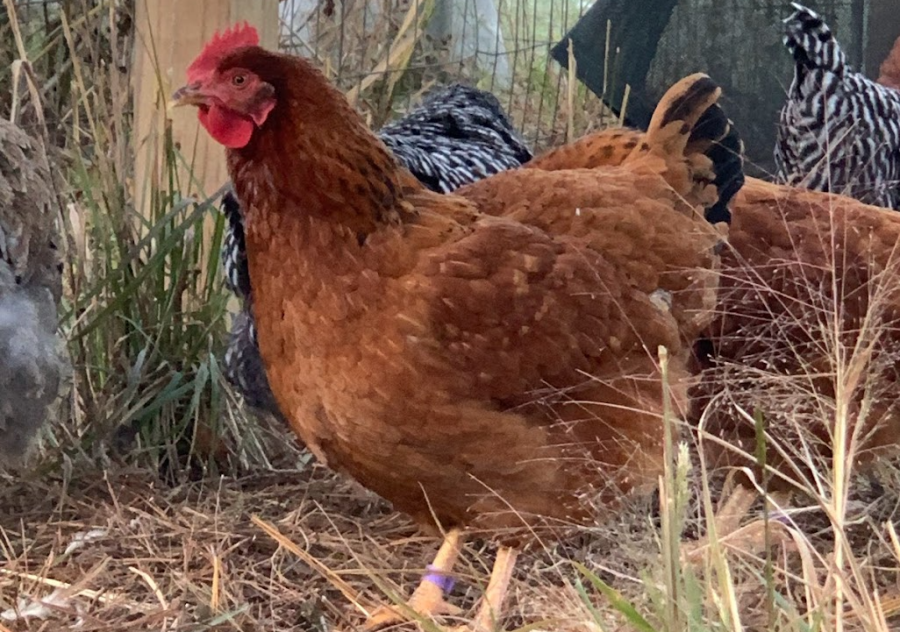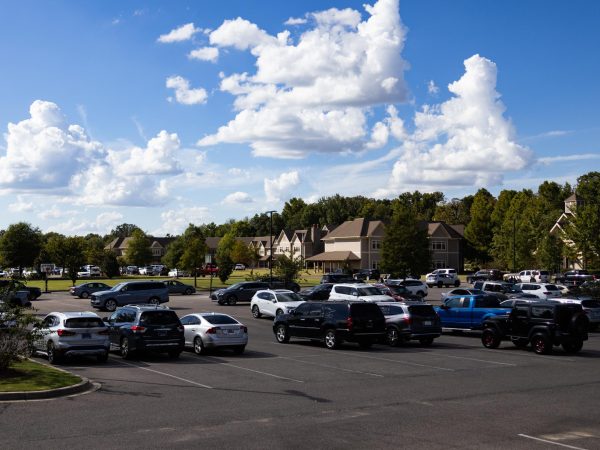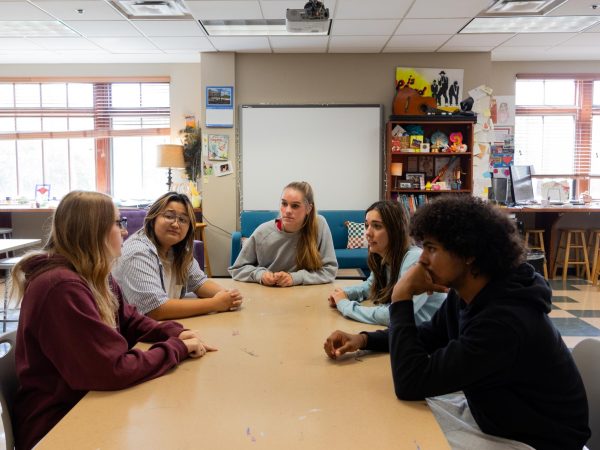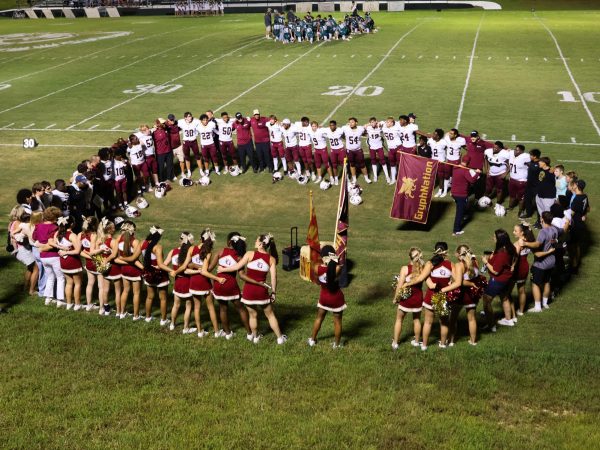Life as a “Chicken Tender”
These chicks are more lovable than you think!
Photo: Ella Straub
Sushi strikes a pose. She’s all grown up now!
What began with agreeing to help take care of our school’s chickens turned into both my senior independent study and an emotional investment as I grew more involved in the lives of our feathered friends in-residence.
Like many students, I was aware that a former senior project (see the article, The Birds and The Bees, for more!) involved building our chicken coop and bee houses on the Bulldog Pond peninsula, but I never knew how much work went into maintaining these animals until this year. In fact, I knew little about the coop in general, which is why I decided to write this article about my experiences with the flock so that other students might become interested in the fun of raising chickens!
Before I delve into how I decided to dedicate my senior project to the coop, I’ll provide some context that allows me to show off some pictures of how our birds have grown since they arrived here.
Between the hot summer weather and terminal illnesses, our coop experienced the loss of all its 2021 hens during the past summer, with the exception of one hen who later passed due to sickness (rest in peace, Diane.)
Our rooster, Jude, remained the sole, lonely resident of the school’s coop while Diane was in recovery and quarantined, so the current caretakers decided that it was time to bring in some young new hens and rejuvenate the flock.
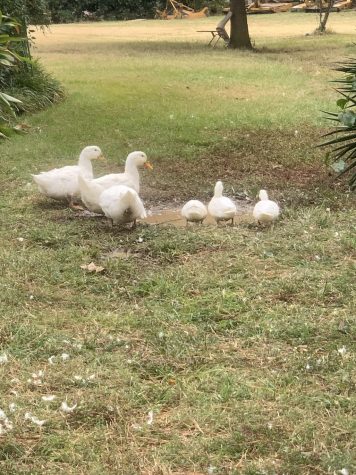
One trip to Mississippi later, and the coop was now home to not only a rooster, but eleven young hens — also called pullets — and four ducks. Now, the coop was busier than ever, and shortly after this I started to help take care of them.
After becoming attached to the lovable little guys, I decided that my specialized independent study would be to improve the flock’s quality of life and study their behaviors along the way so that I could eventually create a guide for the next generation of chicken enthusiasts among our students.
In studying how the chickens adjusted to their new home, I had the privilege of watching how the group of formerly sickly and scrawny hens grew out of their skittish tendencies and became the sassy, demanding, and spoiled-rotten girls they are today.
Unfortunately, only five of the original eleven hens remain after some tragedies involving predators, congenital abnormalities and natural causes, but these hardships are a normal part of raising chickens, although far from enjoyable.
Our ducks had to be rehomed to a local farm for their safety after we lost one to unforeseen circumstances, however they happily live among others of their kind now!
Tragedies aside, when the ducks moved, I was able to incorporate my first improvement-of-life project for the chickens: renovating the pool into a dust bath.
Chickens and other birds don’t clean themselves using water. Instead they roll around and cover themselves in dust to get rid of any parasites or grime in their feathers.
With the addition of an official dust bath, they no longer had to create little craters in the ground themselves to get the job done, and they also had a neat new playing spot!
Once this was accomplished, my next big task was completing the nets that cover the chicken yard’s ceiling to protect them from predators. Thankfully, this task only took a day to complete, although after recent ice storms the nets need to be repaired.
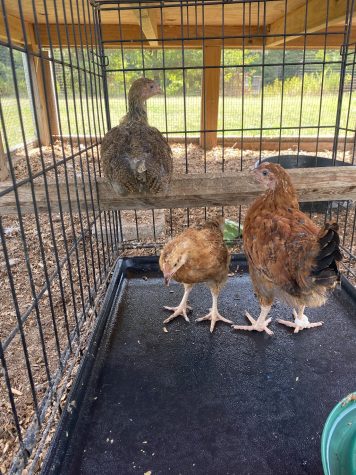
Now, my project focus is on building a new “quarantine coop” to replace our old mini-coop. Right now the little coop is unusable, with an unstable roof and no protection from vermin like rats or mice, but I have the plans ready to assemble a new design before the end of the year, and with my new experiences repairing fence posts and making cold-weather barricades I feel pretty confident in my handyman skills.
Before my time as a senior ends, I also plan to put together a binder full of information on all things chicken, from what they eat to diagnosing illness, so that my work with the coop does not go to waste after I graduate.
Although they are essential to my SIS, these chickens have become more like pets to me over the past semester, so I hope they will continue to thrive even once I am no longer part of their lives. I never thought I would find chickens adorable before I spent some time with them, but they even have unique personalities and mannerisms that make them undeniably cute.
The rooster, Jude, does his best to let me know he hates me with a big show of flapping his wings and crowing as a greeting, but still awkwardly begs at a distance for treats while the others persistently swarm at my feet. Recently, he has begun to show more signs of aggression towards all of his caretakers, doing his best to claw at our legs and feet whenever he pleases. Luckily for us, he is rather small and his claws are no match for a tall pair of rain boots, so a quick ego check can be administered through holding him like a baby until he gives up his foolishness.
The clique of hens are constantly bickering with each other and picking petty fights over their abundant food sources, but they always seem to band together as one when there is something they want, such as the apple slices in my pocket.
Sally is clearly the flock leader, though it is through her motherly tendencies and bravery rather than her scrappiness.
Ella, the hen named after myself, takes the second spot, usually acting as Sally’s sassier shadow.
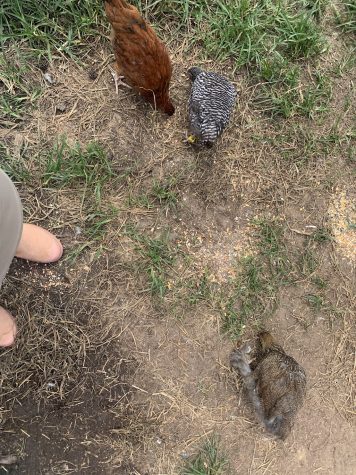
Sushi and Crazy Mazie are younger than the other two Rhode Island Reds, but they get along well and often pair off to explore together without the others.
Unlike the other hens, Lacey is a Brahma, and has feathers on her legs and feet, giving her a fluffy appearance. Despite being as large as Jude, she is the loner of the flock and rarely picks fights, though she easily defends herself when the others try to pick on her.
Chickens are very social animals with competitive hierarchies. the rooster is always on top and the hens maintain their pecking order through little fights and sheer willpower.
Despite their quirks, I’ve grown fond of the flock and their antics, and they have grown more used to me in return.
Did you know that chickens will assign names to people they recognize? They can recognize dozens of human faces, and distinguish them with remarkable accuracy. I don’t know what they have named me, but they definitely know who I am as they run over for treats and attention each time I visit them.
Their strange ways of showing affection make it fun to take care of and get to know them, which is why I think we should have more students or faculty get involved in helping out with their care.
Right now, two of the four students who consistently help maintain the coop are seniors, and even with the help of Mr. Ferguson, Dr. Leung, and Profe Sedeño, there won’t be enough people to take care of them for the next school year.
So, if you’ve made it this far into my extended rant about my beloved chickens and tolerated my parental sense of pride for them, please consider asking about joining the “Chicken Tenders”! Even helping let the flock out of their coop once a week will be a great contribution and it makes a wonderful school-service opportunity, not to mention the chance to make some new feathered friends!


